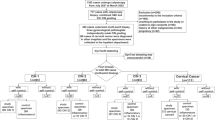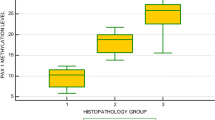Abstract
Purpose
This study is aimed at investigating the significance of gene promoter methylation status and protein expression of p16 INK4A and O6-methylguanine-DNA methyltransferase (MGMT) in the various uterine cervical lesions.
Materials and methods
Methylation status by using methylation-specific polymerase chain reaction (MS-PCR) and protein expression by using immunohistochemistry for p16 INK4A and MGMT genes were performed in cervical squamous intraepithelial neoplasms (CIN), invasive squamous cell carcinomas (SCC), adenocarcinomas and non-neoplastic cervices.
Results
None of 20 non-neoplastic cervices showed p16 INK4A and MGMT gene hypermethylation, whereas at least one of these genes was hypermethylated with 50.0% (5/10) of CIN I, 65.0% (13/20) of CIN II–III, 70.2% (33/47) of SCC and 85.0% (17/20) of adenocarcinoma. p16 INK4A protein was totally negative in non-neoplastic cervices, but positive with 90.0% of CIN I, 100% of CIN II–III and adenocarcinoma, and 78.7% of SCC. MGMT protein was expressed in 10% of non-neoplastic cervices, but significantly increased in SCC (42.5%) and adenocarcinoma (70.0%). The protein expression of p16 INK4A and MGMT was not related to their gene promoter methylation status.
Conclusions
The hypermethylation of p16 INK4A and MGMT genes in the uterine cervix may indicate the presence of malignant cells, and p16 INK4A immunostaining is useful in grading CIN and diagnosing invasive SCC and adenocarcinoma.




Similar content being viewed by others
References
Ahluwalia A, Hurteau JA, Bigsby RW, Nephew KP (2001) DNA methylation in ovarian cancer. Gynecol Oncol 82:299–304
Anda T, Shabani HK, Tsunoda K, Tokunaga Y, Kaminogo M, Shibata S, Hayashi T, Iseki M (2003) Relationship between expression of O6-methylguanine-DNA methyltransferase, glutathione-S-transferase pi in glioblastoma and the survival of the patients treated with nimustine hydrochloride: an immunohistochemical analysis. Neurol Res 25:241–248
Aoyama C, Peters J, Senadheera S, Liu P, Shimada H (1998) Uterine cervical dysplasia and cancer: identification of c-myc status by quantitative polymerase chain reaction. Diagn Mol Pathol 7:324–330
Baylin SB, Herman JG, Graff JR, Vertino PM, Issa JP (1998) Alterations in DNA methylation: a fundamental aspect of neoplasia. Adv Cancer Res 72:141–196
Belanich M, Randall T, Pastor MA, Kibitel JT, Alas LG, Dolan ME, Schold SC, Gander M, Lejeune FJ, Li BFL, White AB, Wasserman P, Citron ML, Yarosh DB (1996) Intracellular localization and intercellular heterogeneity of the human DNA repair protein O6-methylguanine-DNA methyltransferase. Cancer Chemother Pharmacol 37:547–555
Belinsky SA, Nikula KJ, Palmisano WA, Michels R, Saccomanno G, Gabrielson E, Baylin SB, Herman JG (1998) Aberrant methylation of p16 INK4a is an early event in lung cancer and a potential biomarker for early diagnosis. Proc Natl Acad Sci U S A 95:11891–11896
Castle PE, Wacholder S, Lorincz AT, Scott DR, Sherman ME, Glass AG, Rush BB, Schussler JE, Schiffman M (2002) A prospective study of high-grade cervical neoplasia risk among human papillomavirus-infected women. J Natl Cancer Inst 94:1406–1414
Cedar H (1998) DNA methylation and gene activity. Cell 53:3–4
Choy KW, Pang CP, To KF, Yu CB, Ng JS, Lam DS (2002) Impaired expression and promoter hypermethylation of O6-methylguanine-DNA methyltransferase in retinoblastoma tissues. Invest Ophthalmol Vis Sci 43:1344–1349
Citron M, Decker R, Chen S, Schneider S, Graver M, Kleynerman L, Kahn LB, White A, Schoenhaus M, Yarosh D (1991) O6-methylguanine-DNA methyltransferase in human normal and tumor tissue from brain, lung, and ovary. Cancer Res 51:4131–4134
Citron M, Graver M, Schoenhaus M, Chen S, Decker R, Kleynerman L, Kahn LB, White A, Fornace AJ Jr, Yarosh D (1992) Detection of messenger RNA from O6-methylguanine-DNA methyltransferase gene MGMT in human normal and tumor tissues. J Natl Cancer Inst 84:337–340
Cohen Y, Singer G, Lavie O, Dong SM, Beller U, Sidransky D (2003) The RASSF1A tumor suppressor gene is commonly inactivated in adenocarcinoma of the uterine cervix. Clin Cancer Res 9:2981–2984
Dong SM, Kim HS, Rha SH, Sidransky D (2001) Promoter hypermethylation of multiple genes in carcinoma of the uterine cervix. Clin Cancer Res 7:1982–1986
Esteller M, Hamilton SR, Burger PC, Baylin SB, Herman JG (1999) Inactivation of the DNA repair gene O6-methylquanine-DNA-methyltransferase by promoter hypermethylation is a common event in primary human neoplasia. Cancer Res 59:793–797
Ferenczy A, Franco E (2002) Persistent human papillomavirus infection and cervical neoplasia. Lancet Oncol 3:11–16
Gonzalez-Zulueta M, Bender CM, Yang AS, Nguyen T, Beart RW, Van Tornout JM, Jones PA (1995) Methylation of the 5′ CpG island of the p16/CDKN2 tumor suppressor gene in normal and transformed human tissues correlates with gene silencing. Cancer Res 55:4531–4535
Hellend A, Karlsen F, Due EU, Holm R, Kristensen G, Borresen-Dale A (1998) Mutations in the TP53 gene and protein expression of p53, MDM 2 and p21/WAF-1 in primary cervical carcinomas with no or low human papillomavirus load. Br J Cancer 78:69–72
Herfarth KK, Brent TP, Danam RP, Remack JS, Kodner IJ, Wells (1999) A specific CpG methylation pattern of the MGMT promoter region associated with reduced MGMT expression in primary colorectal cancers. Mol Carcinog 24:90–98
Herman JG, Graff JR, Myohanen S, Nelkin BD, Baylin SB (1996) Methylation-specific PCR: A novel PCR assay for methylation status of CpG islands. Proc Natl Acad Sci U S A 93:9821–826
House MG, Guo M, Efron DT, Lillemoe KD, Cameron JL, Syphard JE, Hooker CM, Abraham SC, Montgomery EA, Herman JG, Brock MV (2003) Tumor suppressor gene hypermethylation as a predictor of gastric stromal tumor behavior. J Gastrointest Surg 7:1004–1014
Kleas R, Friedrich T, Spitkovsky D, Ridder R, Rudy W, Petry U, Dallenbach-Hellweg G, Schmidt D, von Knebel Doeberitz M (2001) Overexpression of p16(INK4A) as a specific marker for dysplastic and neoplastic epithelial cells of the cervix uteri. Int J Cancer 92:276–284
Kohya N, Miyazaki K, Matsukura S, Yakushi H, Kitajima Y, Kitahara K, Fukuhara M, Nakabeppu Y, Sekiguchi M (2002) Deficient expression of O6-methylguanine-DNA methyltransferase combined with mismatch-repair proteins hMLH1 and hMSH2 is related to poor prognosis in human biliary tract carcinoma. Ann Surg Oncol 9:371–379
Kokkinakis DM, Ahmed MM, Delgado R, Fruitwala MM, Mohiuddin M, Albores-Saavedra J (1997) Role of O6-methylguanine-DNA methyltransferase in the resistance of pancreatic tumors to DNA alkylating agents. Cancer Res 57:5360–5368
Lea JS, Coleman R, Kurien A, Schorge JO, Miller DS, Minna JD, Muller CY (2004). Aberrant p16 methylation is a biomarker for tobacco exposure in cervical squamous cell carcinogenesis. Am J Obstet Gynecol 190:674–679
Lin H, Huber R, Schessinger D, Morin PJ (1999) Frequent silencing of the GPC3 gene in ovarian cancer cell lines. Cancer Res 59:807–810
Ma S, Egyhazi S, Ueno T, Lindholm C, Kreklau EL, Stierner U, Ringborg U, Hansson J (2003) O6-methylguanine-DNA-methyltransferase expression and gene polymorphisms in relation to chemotherapeutic response in metastatic melanoma. Br J Cancer 89:1517–1523
Mattern J, Koomagi R, Volm M (1998) Smoking-related increase of O6-methylguanine-DNA methyltransferase expression in human lung carcinomas. Carcinogenesis 19:1247–1250
Merlo A, Herman JG, Mao L, Lee DJ, Gabrielson E, Burger PC, Baylin SB, Sidransky D (1995) 5′CpG island methylation is associated with transcriptional silencing of the tumour suppressor p16/CDKN2/MTS1 in human cancers. Nat Med 1:686–692
Medema RH, Herrera RE, Lam F, Weinberg RA (1995) Growth suppression by p16ink4 requires functional retinoblastoma protein. Proc Natl Acad Sci U S A 92:6289–6293
Milde-Langosch K, Riethdorf S, Kraus-Poppinghaus A, Riethdorf L, Loning T (2001) Expression of cyclin-dependent kinase inhibitors p16MTS1, p21WAF1, and p27KIP1 in HPV-positive and HPV-negative cervical adenocarcinomas. Virchows Arch 439:55–61
Muller CY, O’Boyle JD, Fong KM, Wistuba II, Biesterveld E, Ahmadian M, Miller DS, Gazdar AF, Minna JD (1998) Abnormalities of fragile histidine triad genomic and complementary DNAs in cervical cancer: association with human papillomavirus type. J Natl Cancer Inst 90:433–439
Myohanen SK, Baylin SB, Herman JG (1998) Hypermethylation can selectively silence individual p16 INK4A alleles in neoplasia. Cancer Res 58:591–593
Negri G, Egarter-Vigl E, Kasal A, Romano F, Haitel A, Mian C (2003) p16 INK4A is a useful marker for the diagnosis of adenocarcinoma of the cervix uteri and its precursors. An immunohistochemical study with immunocytochemical correlations. Am J Surg Pathol 27:187–193
Nuovo GJ, Plaia TW, Belinsky SA, Baylin SB, Herman JG (1999) In situ detection of the hypermethylation-induced inactivation of the p16 gene as an early event in oncogenesis. Proc Natl Acad Sci U S A 96:2754–2759
Pegg AE, Wiest L, Foote RS, Mitra S, Perry W (1983) Purification and properties of O6-methylguanine-DNA transmethylase from rat liver. J Biol Chem 258:2327–2333
Rosas SL, Koch W, da Costa Carvalho MG, Wu L, Califano J, Westra W, Jen J, Sidransky D (2001) Promoter hypermethylation patterns of p16, O6-methylguanine-DNA-methyltransferase, and death-associated protein kinase in tumors and saliva of head and neck cancer patients. Cancer Res 61:939–942
Rood BR, Zhang H, Cogen PH (2003) Intercellular heterogeneity of expression of the MGMT DNA repair gene in pediatric medulloblastoma. Neuro-oncol 6:200–207
Sano T, Masuda N, Oyama T, Nakajima T (2001) Overexpression of p16 and p14ARF is associated with human papillomavirus infection in cervical squamous cell carcinoma and dysplasia. Pathol Int 52:375–383
Sharma A, Pratap M, Sawhney VM, Khan IU, Bhambhani S, Mitra AB (1999) Frequent amplification of C-erbB2 (HER-2/Neu) oncogene in cervical carcinoma as detected by non-fluorescence in situ hybridization technique on paraffin sections. Oncology 56:83–87
Sherr CI (1994) The ins and outs of RB: coupling gene expression to the cell cycle clock. Trends Cell Biol 4:15–18
Silber JR, Mueller BA, Ewers TG, Berger MS (1993) Comparison of O6-methylguanine-DNA methyltransferase activity in brain tumors and adjacent normal brain. Cancer Res 53:3416–3420
Tringler B, Gup CJ, Singh M, Groshong S, Shroyer AL, Heinz DE, Shroyer KR (2004) Evaluation of p16INK4a and pRb expression in cervical squamous and glandular neoplasia. Hum Pathol 35:689–696
Virmani AK, Muller C, Rathi A, Zoechbauer-Mueller S, Mathis M, Gazdar AF (2001) Aberrant methylation during cervical carcinogenesis. Clin Cancer Res 7:584–589
Walsh CP, Bestor TH (1999) Cytosine methylation and mammalian development. Genes Dev 13:26–34
Widschwendter M, Berger J, Hermann M, Muller HM, Amberger A, Zeschnigk M, Widschwendter A, Abendstein B, Zeimet AG, Daxenbichler G, Marth C (2000) Methylation and silencing of the retinoic acid receptor-beta2 gene in breast cancer. J Natl Cancer Inst 92:826–832
Wigler M, Levy D, Perucho M (1982) The somatic replication of DNA methylation. Cell 24:33–40
Wong YF, Chung TK, Cheung TH, Nobori T, Yim SF, Lai KWH, Yu AL, Diccianni MB, Li TL, Chang MZ (1997) p16 INK4A and p15 INK4B alterations in primary gynecologic malignancy. Gynecol Oncol 65:319–324
Yang HJ, Lin VWS, Wang Y, Chan KYK, Tsang PCK, Khoo US, Cheung ANY, Ngan HYS (2004). Detection of hypermethylated genes in tumor and plasma of cervical cancer patients. Gynecol Oncol 93:435–440
Zaidi NH, Liu L, Gerson SL (1996) Quantitative immunohistochemical estimates of O6-alkylguanine-DNA alkyltransferase expression in normal and malignant human colon. Clin Cancer Res 2:577–584
Acknowledgement
This study was supported by Brain Korea 21 Task Force
Author information
Authors and Affiliations
Corresponding authors
Rights and permissions
About this article
Cite this article
Lin, Z., Gao, M., Zhang, X. et al. The hypermethylation and protein expression of p16 INK4A and DNA repair gene O 6-methylguanine-DNA methyltransferase in various uterine cervical lesions. J Cancer Res Clin Oncol 131, 364–370 (2005). https://doi.org/10.1007/s00432-004-0657-5
Received:
Accepted:
Published:
Issue Date:
DOI: https://doi.org/10.1007/s00432-004-0657-5




